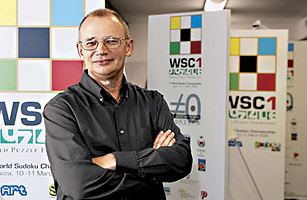
Not since — well, ever — have the numbers 1 to 9 been so popular. In less than a year, sudoku, the numerical logic puzzle with the funny name (pronounced soo-doh-koo), has swept the globe. Nearly every major newspaper in America has now started a daily sudoku, as have a multitude of papers abroad. Sudoku books rule the puzzle and game best-seller lists, beating out crosswords, poker and everything else. And it's not just on paper. Handheld electronic devices, capable of generating a seemingly infinite number of original sudoku puzzles, sell briskly.
The man responsible for the mania is Wayne Gould, 60, a mild-mannered New Zealand puzzle enthusiast, formerly a judge in the criminal courts of Hong Kong. In 1997 he spotted a sudoku volume in a bookstore in Tokyo. He fell in love with the game. During the next few years he wrote a computer program for generating sudoku puzzles and — just as important — rating their difficulty. In November 2004 he persuaded the London Times to print them. The rest, as they say, is history.
While Gould didn't invent sudoku (credit goes to Howard Garns, an Indianapolis architect, in the 1970s; the puzzle eventually made its way to Japan, where it got its modern name), Gould had the genius to recognize its elemental, addictive appeal. He also had a brilliant if counterintuitive marketing model: give the puzzle away. More than 400 newspapers worldwide run his Pappocom sudoku puzzles free in return for promoting Gould's computer program and books. The results must be lucrative, as sales of the books alone have passed 4 million.
Sudoku lovers, be happy. Like the crossword, sudoku shows every sign of being here to stay.
Shortz is the crossword-puzzle editor of the New York Times